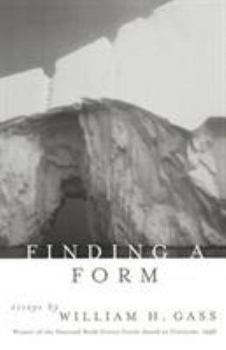Finding a Form: Towards a Response Contagion Theory of Persuasion
Select Format
Select Condition 
Book Overview
"No one is better than William H. Gass at communicating the sublime and rapturous excitement of reading." Washington Post This description may be from another edition of this product.
Format:Paperback
Language:English
ISBN:0801484898
ISBN13:9780801484896
Release Date:September 1997
Publisher:Cornell University Press
Length:368 Pages
Weight:1.00 lbs.
Dimensions:0.9" x 5.5" x 8.4"
Age Range:18 years and up
Grade Range:Postsecondary and higher
Customer Reviews
2 ratings
Brilliance can be hard to look at...
Published by Thriftbooks.com User , 15 years ago
--difficult to see, and not always comfortable to read. But make no mistake about it, Wm Gass is a brilliant writer and *Finding a Form* a book of essays that give off light with the profligacy of a sun on steroids. --How many times in how many reviews must I feel it incumbent upon me to warn prospective readers: this book isn't for everyone. --Sadly, quite a lot. And this is indeed one of those books. --Where Gass might say something in a sentence of eight words he'll say it in eighty; where he might get his meaning across concretely, he prefers instead a suggestive metaphor. These are not faults, as far as he's concerned, but the play of an intellect that loves language, that caresses words and sentences until they waken, breathe, and sing. --And this is not a fault as far as I'm concerned either. --Gass is an unabashed sensualist when it comes to words. He believes passionately that the sentence, properly fashioned, lives the way Adam lived when created by God. He believes that a sentence is a living piece of the author's very consciousness--joyful, mournful, pensive, playful, intense and intent upon discovery and expression. --Many of these essays are about the act of writing and the complimentary act of reading themselves; two are semi-biographical musings on the philosophers Nietzsche and Wittgenstein. Trained as a philosopher, Gass has a philosophically-inclined mind himself and a particularly interesting and cogent insight on the subject. Other essays take as their starting point a review of a particular book or author Gass has read. But as you can't judge a book by its cover, it's not easy to deduce what a Gass essay is by its title. --Part of the thrill of reading these essays is in how beautifully they're written, but also in being treated to the breadth of Gass's eclectic and astounding intellect. There are always detours, segues, surprises, and even non-sequiturs...often the sidetrips and dead-ends prove more rewarding than the scheduled destination. So it is that an essay that examines the abuse of the present tense in contemporary literature, for instance, roams far afield into areas of philosophy and psychology and the politics of self-identity. Personal anecdotes pop up, fresh interpretations of mythology, musings on near and ancient history...basically anything can turn the essay enroute towards a new direction. --As Gass proposes in the final essay of this collection, the best sort of writing encourages a communion between author and reader, in which the former extends an invitation into his mind and the latter finds the invitation enticing enough to accept. Together, they set off on a shared journey of discovery that lasts until interest flags, the writing sags, or the pages run out. --I cracked this book open to the essay on Wittgenstein and before I'd even finished it I got online and bought the other available collections of Gass's essays, as well as his novel *The Tunnel.* I had a feeling I wouldn't regret it; a
The Music of Gass
Published by Thriftbooks.com User , 26 years ago
For anyone tired with the last fifteen years of "hip" postmodernism, this is an inspiring collection of darkly comic and seriously focussed essays ranging from the dillema of language and meaning to the innanity of literary prizes (which is especially juicy and hostile due to the fact that Gass, in the ranks of Pynchon, Gaddis, Reed, Coover and Ashberry, has never won one). Gass's prose cranks up the brain with lightening quickness, exercising synapses that haven't seen this much attention since German romantic criticism. He explores the epiphanies of recognition much differntly than the contemporary semioticians and psychanalysers because he expands his own inquiries in a playful use of language that demonstrates rather than deconstructs. Gass may not be our Walter Benjamin, but in an American literary landscape reluctant to relax and break wind he is our flatulator par excellence.





